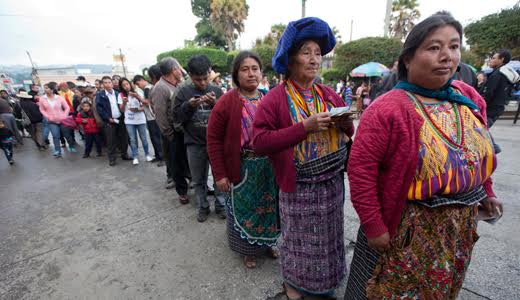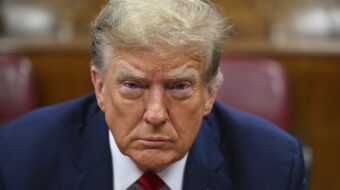
Within hours after the Guatemalan Congress stripped him of immunity Sept. 2 the country’s president, Otto Perez Molina, resigned and was arrested on charges of corruption and accepting bribes.
The elections that followed Sunday, Sept. 6, sent a confused message, with a runoff for president now slated for Oct. 25.
The case against Perez Molina, a right-wing former general trained at the School of the Americas in Fort Benning, Georgia, is based on intercepted phone calls which reveal that he was responsible for naming corrupt individuals to work in the customs department. Those individuals then channeled millions of dollars of bribes from importers to Perez Molina personally, to former Vice President Roxanna Baldetti, who is also imprisoned and awaiting trial, and to themselves.
In exchange for the bribes, the importers were charged much lower customs duties than otherwise would be the case. This scandal, which is called “La Linea,” has led to months of massive multi-class demonstrations in Guatemala City and around the country. The evidence against Perez Molina and his cronies was presented to the public by the United Nations-sponsored Commission Against Impunity in Guatemala (C.I.C.I.G.) and Attorney General Thelma Aldana.
The demonstrations were so large and effective that nobody, not even from Perez Molina’s own Patriotic Party, voted against the measure to strip the president of his immunity. Upon Perez’ resignation, the deputies immediately accepted it.
On Thursday, Perez Molina, now placed in custody, was replaced by his vice president, Alejandro Maldonado. Guatemala proceeded to presidential and legislative elections on Sunday, Sept. 6.
But in spite of widespread rejoicing, Guatemala may be only beginning a new problematic phase of its tortured political life which began when the U.S. Central Intelligence Agency overthrew left wing, democratically-elected President Jacobo Arbenz in 1954.
Arbenz annoyed the Eisenhower administration by tolerating the Communist Party, and by promoting labor and land reform policies that impinged on U.S. corporate interests. The latter entailed redistributing to poor farmers vast amounts of unused farmland owned by the United Fruit Company, for whom both the Dulles brothers, Secretary of State John Foster Dulles and Director of Central Intelligence Allen Dulles, had done legal work. So the C.I.A., working with the Guatemalan right, organized Arbenz‘ overthrow and the suppression of his reforms.
To suppress the left-wing guerilla movement that arose subsequently, the U.S. supported Guatemalan military kept up a pattern of intense repression against the left and labor, and, to a genocidal extent, the Maya indigenous people who constitute about half the population. Unaccountable, authoritarian military government also opened the door to corruption in which the military itself became intimately involved. Until a peace treaty between the government and the guerillas of the U.R.N.G. (Guatemalan National Revolutionary Unity) was signed in 1996, at least 200,000 people, mostly innocent civilians had been killed by the army and right wing death squads.
The worst single outburst happened in 1983, under the dictatorship of General Efrain Rios Montt. At the time, Perez Molina worked under Rios Montt’s command in the Ixil Triangle, where the army slaughtered thousands of indigenous people. Guatemala has never really recovered; with a population of 15.5 million it is one of the poorest and most violent countries in Latin America, and a source of many desperate immigrants trying to come to the United States.
In May, 2013, General Rios Montt was convicted of genocide and crimes against humanity by a Guatemalan court. However, the conviction was almost immediately annulled by a higher court. As it happens, a key judge in the decision to reverse the Rios Montt verdict was none other than right-wing extremist Alejandro Maldonado, who is now Guatemala’s interim president until a new president is inaugurated in January. (Efforts to re-try Rios Montt have so far stalled as his lawyers’ claims that he is now senile).
Nor is any security to be derived from Sunday’s elections, which some had been trying to postpone. Many of the 14 presidential tickets had also been implicated in the scandals, as have numerous candidates for other offices.
On Monday, with nearly all votes in, it appeared that there will be a presidential runoff between Jimmy Morales of the National Convergence Front, who got 23.9 percent of the vote, and Sandra Torres of the National Unity for Hope Party, with 19.68 percent. Yet the difference between vote totals of Torres and a third candidate, Manuel Baldizon of the LIDER party, who got 19.56 percent, is less than a thousand, so a Morales-Baldizon runoff is possible.
Morales is a comedian, actor and political novice whose attraction was the fact that he was not named in the corruption investigations. Yet his support networks include extreme right-wing military officers implicated in human rights abuses, and some see him as a hard-right sleeper.
Torres, the wife of former president Alvaro Colom, is a centrist whose vote base is among poor, rural and indigenous Guatemalans, who appreciate her for the role she played in the Colom government in providing services to their communities. So a Morales -Torres match- up would be a right-center contest.
However, Baldizon is a right-wing populist who calls for the use of the death penalty, and who was friendly with Perez Molina until near the end. Baldizon is seen as close to criminal elements in the northern Peten region, and his vice presidential candidate, Edgar Barquin, has been named in the corruption investigations as being implicated in illegal influence-peddling . So a Morales – Baldizon runoff would be right against right.
Zury Rios Sosa, the daughter of former dictator Rios Montt, with 5.93 percent, fell far short of the votes needed for the runoff. So did other candidates, including former left wing guerrilla leader Miguel Angel Sandoval, of the U.R.N.G.-Maiz and Winaq parties, and Anibal Garcia of the New Republic Movement.
Photo: Guatemalans wait in line during their country’s general elections at a polling station in San Juan Sacatepequez, Guatemala, Sept. 6. Guatemalans began heading to the polls after they opened early Sunday. No clear message emerged from the election since none of the presidential candidate received a majority of the votes and a runoff had to be scheduled for October. | Moises Castillo/AP












Comments